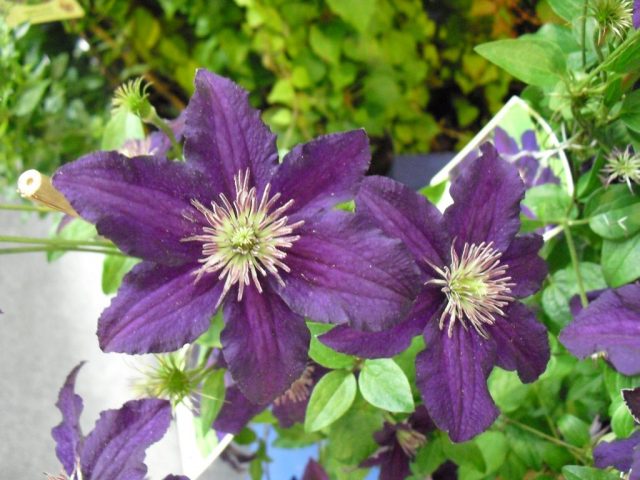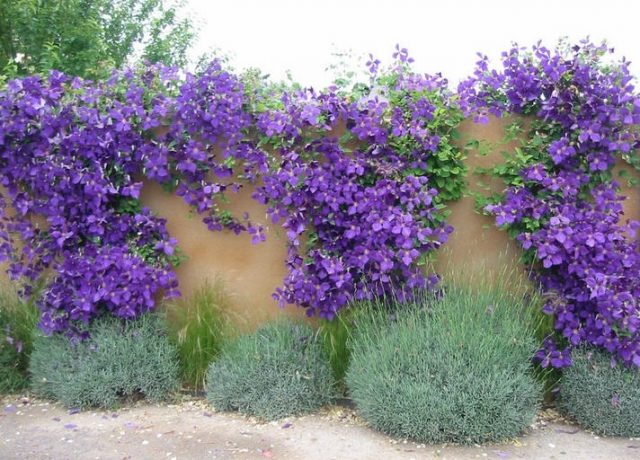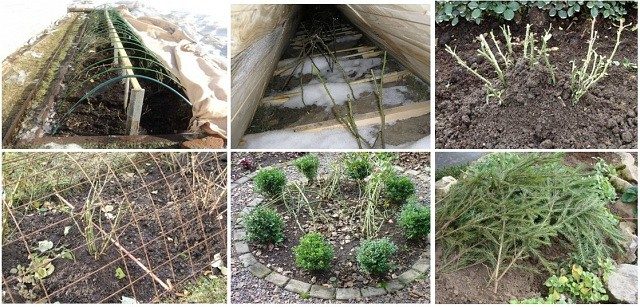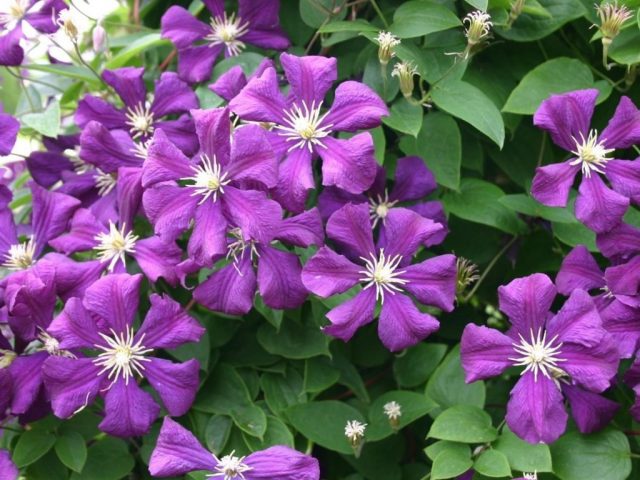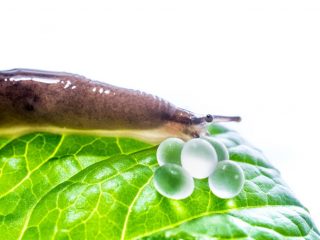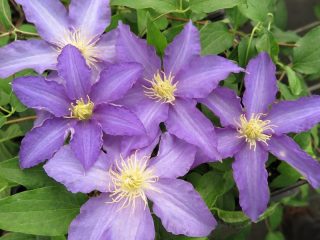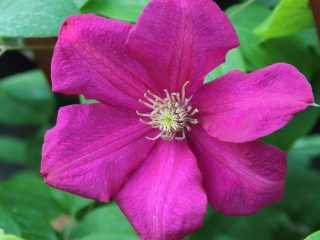Content
Landscape designers use delicate clematis Etoile Violet as a living decoration. Because they are easy to care for, flowering vines are favorites in vertical gardening. A variety with huge buds adapts to any conditions. If you know the peculiarities of growing a plant, then you don’t have to worry about cultivation problems.
Description of clematis Etoile Violet
Decorative large-flowered clematis Etoile Violet is a popular hybrid that belongs to the Viticella group. The length of the graceful bush reaches 4 m. Flat elongated leaves are collected on a petiole in 3 plates. Resistant to cold, withstands frost down to -20 C.
Huge buds are a distinctive feature of clematis varieties Etoile Violette. Purple-violet petals with a dark stripe, reflexed tips and wrinkled veins on the surface. Long thick stamens are located around a miniature pistil. With proper care, the diameter of each specimen ranges from 9 to 15 cm. Abundant flowering lasts from June to September.
Clematis pruning group Etoile Violet
Removing shoots is an important procedure that helps maintain the beauty of ornamental vines.According to the intensity of branching, clematis are usually divided into three types. Pruning vines stimulates the development of the root system and facilitates the formation of branches.
Purple clematis variety Etoile Violette belongs to group 3. The plant intensively grows green mass, but buds form only on new shoots. In order for the crop to bloom, you need to cut off the branches. The bush is left with small stumps (within 20-50 cm from the ground), with 4 healthy internodes. The event is held before the onset of frost - in the fall, from October to November.
Planting and caring for clematis Etoile Violet
To get clematis Etoile Violet blooming, as in the photo, you need to choose a suitable place. The variety likes to grow in an area protected from drafts. The light-loving hybrid forms lashes and buds better under intense ultraviolet radiation, so they prefer the south or southwest side.
The plant loves fertile soil, which perfectly allows water and oxygen to pass through. It develops best in loose loam. Clematis Etoile Violet is contraindicated in saline or acidic soil. The variety develops slowly, often gets sick, the flowering is small and short.
Planting in the soil is carried out twice a year - in spring and autumn. Before planting, the roots are soaked for an hour in a solution of fungicide and growth activator. Dig a hole according to the pattern 60x60x60 cm, pour onto the bottom:
- drainage – 15 cm;
- wood ash – 1 l;
- humus - 1 bucket;
- mineral fertilizer – 100 g.
A trellis for lashes is mounted on the sides of the pit. A small hill is formed above the fertilizers, on which the bush is planted.The liana is installed in such a way that the root collar remains above the ground (at least 5 cm). Clematis Etoile Violet is buried and watered generously with warm water.
Clematis is unpretentious in terms of care. Weeds are regularly removed from the root circle area. Good aeration protects the underground parts from rotting, so the soil is carefully loosened. Mulching with peat and sawdust will make growing easier.
Clematis Etoile Violet should be watered frequently and abundantly. With a lack of moisture, flowers become smaller, the intensity and duration of budding decreases. In hot weather, irrigation is carried out every other day, after sunset. Adult bushes need at least 2 buckets of liquid, while young bushes need one. Use warm, settled water.
Regular feeding affects the quality of flowering. The first year the seedlings are fed from reserves in the planting hole, so no additional additions are needed. After wintering, clematis Etoile Violet is fertilized during spring and summer. Alternate rotted organic matter with complex mineral products. Once a month, foliar treatment is used per leaf.
A fast-growing vine needs to be tied to a trellis. The plant looks impressive on a gazebo, arch and decorative fence. To prevent the support from bending under the weight of the greenery, you need to choose a strong material for the structure. The best way to cope with the task is a structure made of metal mesh stretched over pipes.
Preparing for winter
Clematis Etoile Violet belongs to the 4th class of frost resistance. Decorative crops will withstand cold down to -20 C in a snowy winter. If you take care of additional protection in advance, frosts down to -35 C will not become a problem. In autumn, the plant is irrigated abundantly and no longer fertilized. After the leaves fall, the branches are pruned.To prevent the bush from rotting, it is necessary to treat the root collar with copper-based fungicides (vitriol, Bordeaux mixture).
The root circle area is covered with a thick layer of mulch. A mixture of ash, sand and humus is poured under the clematis Etoile Violet in October. By the end of autumn, the plant is additionally hidden under sawdust and pine spruce branches. Such protection allows oxygen to pass through perfectly and will prevent the cold from freezing the underground parts.
Reproduction
Varieties with large buds do not retain maternal characteristics when sown. Young, non-woody vines are propagated by dividing the bush. Clematis is dug out of the ground, got rid of the soil and carefully cut along the roots with a sharp knife and pruning shears.
If strong branches remain during pruning in the fall, then they can be used for cuttings. Remove the remaining greenery and divide the vines into pieces with buds. The planting material is placed in a hole with peat, buried and insulated with pine needles and leaves. In the spring, the protection is removed, the area is abundantly irrigated and mulched. By the end of summer, young vines are ready for planting.
In the description of the clematis variety Etoile Violet with photo, it is recommended to propagate the bush by layering. During the growing season, a whip with a visible eye is dropped into pots next to the mother specimen. The specimen is watered abundantly, and solutions of root formation stimulants (Zircon, Kornevin) are used. By autumn, the seedlings are ready to move to a permanent place of growth.
Diseases and pests
In the heat, the climbing bush suffers from invasions of scale insects and spider mites, sucking out the intercellular fluid in the greenery. Aphids move from neighboring plants and prefer to feed on young foliage and branches. Grape snails and slugs are found in clematis Etoile Violet in mid-spring, and in winter the owner should beware of mice.
Decorative vine has a strong immune system, so problems arise only if the growing rules are violated. The most dangerous diseases are fungi:
- gray rot;
- fusarium;
- powdery mildew.
The pathogen lives in the soil, is not afraid of frost and becomes active in the spring. Diseases destroy the root system and then move to the shoots. To save clematis Etoile Violet, you need to use Fundazol. All parts of the plant are sprayed with the solution and the soil around is watered.
The foliage and vine shoots are covered with brown spots of fungal rust. In affected specimens, the lashes become deformed, the greenery loses turgor and dries out. Dead bushes are dug up and the area is disinfected. To destroy the disease, you must use a 1% solution of Bordeaux mixture at the first sign.
Conclusion
Purple clematis Etoile Violet looks impressive, so it will be an excellent addition to landscape design. The decorative vine is not demanding in terms of care and will withstand minor mistakes of beginners. The graceful plant is propagated by the vegetative method.
Reviews of clematis Etoile Violet
